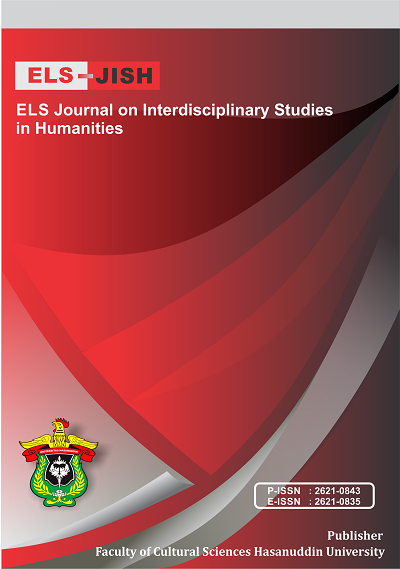Developing Interactive Instructional Modules for Core Principles of English Language Teaching
DOI:
https://doi.org/10.34050/elsjish.v5i3.22113Keywords:
ADDIE, Core Principles on ELT, ModulesAbstract
This research aims to develop instuctional modul of core principles of EFL Material dealing with English Education Program curriculum at Tarbiyah and Teacher Traning Faculty of STAIN Majene. This research conducted a Research and Development (R&D) by using ADDIE Model. The subject of this research was core principles of EFL Material dealing with English Education Program curriculum of Tadris Bahasa Inggris STAIN Majene. The data of this research were collected and analyzed in proccess of development through Model.The result of the research reveal that the the developing of core principles in ELT class was needed by student. The ADDIE Model can really help the lecturer to develope material for teaching. This research has been trying to develop Core Principle of English Languge Teaching materials in the STAIN Majene which consists of Language Components in English Language Teaching; Methods and Approaches in Language Teaching; and Evaluation and Assessment on Language Teaching which divided into some subtopics which are Language Components covering Elements of Language and Language Skills, then Methods and Approaches in Language Teaching covering The Development of Methods and Approaches of Language Teaching in the world; Kinds of Methods and Approaches in Language Teaching; and Current Methods and Approach in Language Teaching. Evaluation and Assessment on Language Teaching covering The Introduction of Measurement in Language Teaching; and Constructing Evaluation and Assessment Tools in Language Teaching.
References
Al-Obaydi, L. H., Nashruddin, Rahman, F. F., & La Ode Achmad Suherman. (2021). The Use of Action Research in EFL Socio-professional Context: Students-teachers’ Perceptions. ELS Journal on Interdisciplinary Studies in Humanities, 4(2), 232-240. https://doi.org/10.34050/elsjish.v4i2.10876
Cook, Mi. P. (2006). Visual Representations in ScienceEducation: The Influence of PriorKnowledge and Cognitive LoadTheory on Instructional DesignPrinciples. Science Education, 90(6), 1073 – 1091. https://doi.org/10.1002/sce
Dignath, C., & Veenman, M. V. J. (2021). The Role of Direct Strategy Instruction and Indirect Activation of Self-Regulated Learning—Evidence from Classroom Observation Studies. Educational Psychology Review, 33(2), 489–533. https://doi.org/10.1007/s10648-020-09534-0
Gagne, R. M., Wager, W. W., Golas, K. C., Keller, J. M., & Russell, J. D. (2005). Principles of Instructional Design (Issue February).
Moradi, M., Liu, L., Luchies, C., Patterson, M. M., & Darban, B. (2018). Enhancing teaching-learning effectiveness by creating online interactive instructional modules for fundamental concepts of physics and mathematics. Education Sciences, 8(3). https://doi.org/10.3390/educsci8030109
O’Malley, K. (2014). Supplemental Instruction:Best Practices Literature Review. DePaul University.
Prastowo, A. (2015). Panduan Kreatif Membuat Bahan Ajar Inovatif. Diva Press.
Shuy, T. (2020). Self-R egulated Learning. American Institues for Research.
Smaldino, S. E., Lowther, D. L., & Mims, C. (2012). Instructional Media and Technology for Learning. International Journal of Distributed and Parallel Systems, 3, 8.
Wright, D. L. (1986). Teaching the Introductory–Level Course: A Special Challenge. To Improve the Academy, 5(20201217). https://doi.org/10.3998/tia.17063888.0005.018
Downloads
Published
How to Cite
Issue
Section
License
Copyright (c) 2022 Achmad Taqlidul Chair Fachruddin

This work is licensed under a Creative Commons Attribution-NonCommercial-ShareAlike 4.0 International License.






